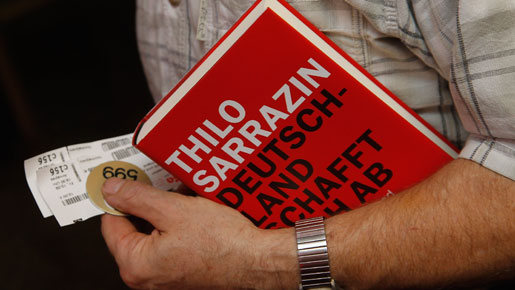
A German central bank board member who caused outrage with remarks about Muslim immigrants and Jews has resigned after coming under pressure from political leaders including Chancellor Angela Merkel.
The Bundesbank said Thilo Sarrazin, 65, who accused Turks and Arabs of exploiting the welfare state, refusing to integrate and lowering the
average intelligence, would leave his post at the end of the month.
“Dr Sarrazin has asked the president to relieve him of his duties,” the bank said in a brief statement and Sarrazin himself confirmed he had
stepped down during a book reading in Potsdam near Berlin.
He had already been relieved of some of his central bank responsibilities over remarks he made last year about immigrants but the strict independence of the central bank made it difficult to have him removed.
However, after he published stronger comments in his new book “Deutschland schafft sich ab” (“Germany does away with itself”) and remarks in the run-up to its publication, Merkel and President Christian Wulff gave strong hints he should step down.
Sarrazin argues in the book that Muslims undermine German society and threaten to change its character and culture with their higher birth rate. He angered many by saying “all Jews share a particular gene”.
The central bank board voted unanimously for his removal, which required the approval of the head of state.
“If found it too risky in the current atmosphere … to stand up to the entire political and media establishment. That would be presumptuous and would not have worked,” Sarrazin said at the book reading after news of his resignation.
“So, a strategic retreat and now (I will) work on the topics that are important to me,” Sarrazin added.
He had previously vowed to fight attempts to remove him, raising the prospect of a bruising court case that would have raised questions over
whether Merkel, her ministers and Wulff had acted correctly.
Merkel, senior ministers and the main political parties criticised Sarrazin, who belongs to the centre-left Social Democrats (SPD) and is a formerfinance chief of the city of Berlin.
The SPD has launchedproceedings to expel him, although a recent opinion poll showed this would be unpopular with the public and SPD voters, who believed the party should devote its attentions to more important matters.
“I want no selection by genetics … as a Social Democrat,” SPD party leader Sigmar Gabriel told a TV show after the resignation, adding that Sarrazin had “crossed a line and people in the party are saying it’s not with us”.
A legal battle to remove him from the central bank or from the party could risk making him a hero figure and embroil
the government in a dispute at a time of falling poll ratings.
Sarrazin has become an embarrassment for Bundesbank President Axel Weber, who several German leaders hope will succeed Jean-Claude Trichet as president of the European Central Bank next year when the Frenchman’s contract runs out.

